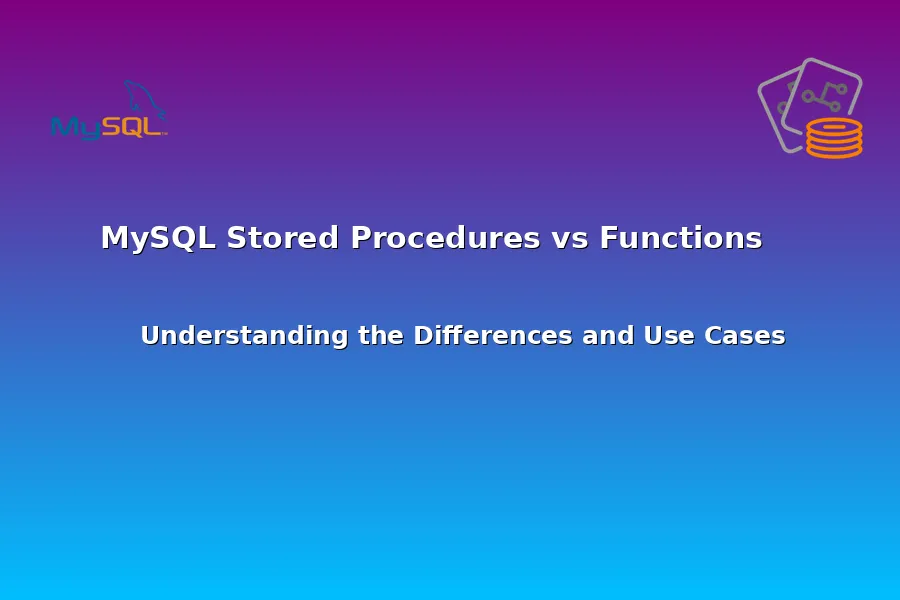Introduction to MySQL Stored Procedures and Functions
In the world of MySQL database management, two powerful tools often come up in discussions: stored procedures and functions. While both are essential for optimizing database operations, they serve different purposes and have distinct use cases. This blog post will explore the differences between MySQL stored procedures and functions, and provide guidance on when and how to use each effectively.
Understanding Stored Procedures and Functions
Stored Procedures
Stored procedures are pre-compiled SQL statements stored in the database. They can:
- Accept input parameters
- Perform multiple operations
- Return multiple values or result sets
- Contain control flow statements (IF, WHILE, etc.)
- Modify database state
Functions
Functions are also pre-compiled SQL statements, but with some key differences:
- Must return a single value
- Cannot modify database state (except for UDFs with DETERMINISTIC, NO SQL, or READS SQL DATA characteristics)
- Can be used in SQL statements wherever expressions are allowed
When to Use Stored Procedures
- Complex Operations: When you need to perform a series of SQL operations as a single unit.
- Data Integrity: For operations that require multiple steps to maintain data consistency.
- Security: To restrict direct access to tables and provide a controlled interface to the data.
- Performance: To reduce network traffic by sending only the call to the procedure instead of multiple SQL statements.
- Maintenance: When you want to centralize business logic for easier updates and maintenance.
When to Use Functions
- Calculations: For complex calculations that you want to reuse across multiple queries.
- Data Transformation: To standardize data formatting or transformation logic.
- Custom Aggregations: When you need custom aggregation logic that isn’t available in built-in MySQL functions.
- Encapsulation: To encapsulate complex logic that returns a single value and can be used in SELECT statements.
How to Create and Use Stored Procedures
Here’s a basic example of creating and using a stored procedure:
DELIMITER //
CREATE PROCEDURE GetEmployeesByDepartment(IN dept_name VARCHAR(50))
BEGIN
SELECT * FROM employees
WHERE department = dept_name;
END //
DELIMITER ;
Using the stored procedure:
CALL GetEmployeesByDepartment('Marketing');
How to Create and Use Functions
Here’s an example of creating and using a function:
DELIMITER //
CREATE FUNCTION CalculateBonus(salary DECIMAL(10,2), performance_score INT)
RETURNS DECIMAL(10,2)
DETERMINISTIC
BEGIN
DECLARE bonus DECIMAL(10,2);
SET bonus = salary * (performance_score / 100);
RETURN bonus;
END //
DELIMITER ;
Using the function in a SELECT statement:
SELECT employee_name, CalculateBonus(salary, performance_score) AS bonus
FROM employees;Best Practices
- Naming Conventions: Use clear, descriptive names for your procedures and functions.
- Input Validation: Always validate input parameters to prevent SQL injection and ensure data integrity.
- Error Handling: Implement proper error handling within your procedures and functions.
- Documentation: Comment your code and maintain documentation for all stored procedures and functions.
- Performance Consideration: Monitor the performance impact of your procedures and functions, especially for frequently used ones.
Conclusion
Both stored procedures and functions are valuable tools in MySQL database development. Stored procedures excel at encapsulating complex, multi-step processes and maintaining data integrity, while functions are ideal for reusable calculations and data transformations within SQL statements. By understanding their strengths and appropriate use cases, you can leverage these features to create more efficient, maintainable, and secure database applications.
Remember, the choice between a stored procedure and a function often depends on your specific requirements, the complexity of the operation, and how you intend to use the result. With practice and experience, you’ll develop an intuition for when to use each, enhancing your MySQL development skills and improving your database designs.
FAQs
- What are the main differences between stored procedures and functions?
Stored procedures can return multiple values and modify the database, while functions must return a single value and cannot modify the database. - When should I use a stored procedure over a function?
Use stored procedures for complex operations that involve multiple steps, data modification, or when you need to centralize business logic. Use functions for simple calculations or data retrieval tasks. - Can a function modify database data?
No, functions cannot modify database data. They are limited to read-only operations and must return a single value. - How do I optimize the performance of my stored procedures?
Optimize your stored procedures by minimizing the number of SQL statements, using indexing, and reducing network traffic by bundling operations within the procedure. - What security measures should I consider when using stored procedures and functions?
Implement proper access controls, validate inputs, and use parameterized queries to prevent SQL injection. - Are there any scenarios where neither stored procedures nor functions are recommended?
Yes, for extremely simple queries or when application-level logic is preferable, it might be better to avoid using stored procedures or functions.


